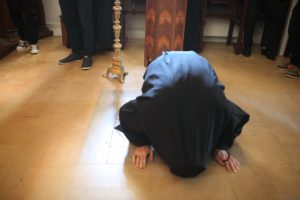Vocal prayer, mental prayer and prayer of the heart
8 June 2016[Previous Publication: http://pemptousia.com/2016/06/how-can-we-fight-our-passions/]
The Russian hieromonk Dorotheus, a great instructor in spiritual asceticism, who was in this respect very much like St. Isaac the Syrian, counsels those who are learning the Jesus Prayer to recite it aloud at first. The vocal prayer, he says, will of itself turn into the mental.

“Mental prayer,” he continues, “is the result of much vocal prayer, and mental prayer leads to the prayer of the heart. The Jesus Prayer should not be said in a loud voice but quietly, just audibly enough that you can hear yourself.,’ It is particularly beneficial to practice the Jesus Prayer aloud when assailed by distraction, grief, spiritual despondency and laziness. The vocal Jesus Prayer gradually awakens the soul from the deep moral slumber into which grief and spiritual despair are wont to thrust it. It is also particularly beneficial to practice the Jesus Prayer aloud when attacked by images, appetites of the flesh, and anger; when their influence causes the blood to boil. It should be practiced when peace and tranquillity vanish from the heart, and the mind hesitates, becomes weak, and—so to speak—goes into upheaval because of the multitude of unnecessary thoughts and images. The malicious princes of the air, whose presence is hidden to physical sight but who are felt by the soul through their influences upon it, hearing as they mount their attack the name of the Lord Jesus—which they dread—will become undecided and confused, and will take fright and withdraw immediately from the soul. The method of prayer which the hieromonk suggests is very simple and easy. It should be combined with the method of St. John of the Ladder: the Jesus Prayer should be recited loud enough that you can hear yourself, without any hurry, and by locking the mind into the words of the prayer. This last, the hieromonk enjoins upon all who pray by Jesus’ name.
The method of prayer propounded by St. John of the Ladder should be adhered to even when one is practicing the method which was explained by the divine St. Nilus of Sora, in the second homily of his monastic constitution. The divine Nilus borrowed his method from the Greek Fathers, Symeon the New Theologian and Gregory of Sinai, and simplified it somewhat. Here is what St. Nilus says: “Experience will soon confirm as correct and very beneficial for mental concentration the recommendation of these holy fathers regarding restraint in breathing, i.e. that one should not breathe with great frequency.” Some, without understanding this method, exaggerate its importance and restrain their breath beyond reasonable measure, thereby injuring their lungs and at the same time inflicting harm upon their souls by assenting to such a mistake. All impulsive and extreme actions are but obstacles to success in prayer, which develops only when nurtured by the tranquil, quiet and pious disposition of both soul and body. “Whatever is immoderate comes from the demons,” says St. Pimen the Great.
(To be continued)






